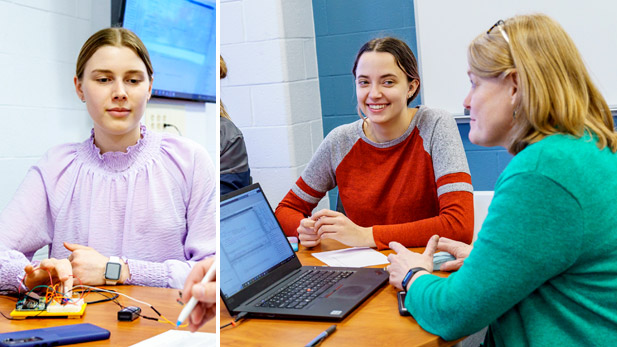Biomedical Engineering Design Course Makes Learning Fun & Impactful

A project-based Design Leadership & Teamwork course had sophomore biomedical engineering students developing decision-making, leadership and management skills while creating games focused on health care issues.
Before biomedical engineers can solve health care problems, they must understand and have empathy for those afflicted by those medical problems. And they must work together to design solutions to those challenges.
That’s the premise of a project-based Design Leadership & Teamwork course that helps sophomore biomedical engineering students develop important skills in decision-making, leadership and management of complex design projects.
During the 10-week course, students worked in small teams to study such medical problems as color blindness and anxiety and then developed games that helped others better understand and sympathize with persons that deal with those common disabilities.
The test anxiety game had players trying to correctly answer a series of increasingly difficult questions under stressful situations. Meanwhile, a color blindness test helped users appreciate a world in which they couldn’t differentiate objects by an assortment of colors.
“Test anxiety is something that college students are well aware, but we needed to sympathize with people of younger and older age groups as well,” said second-year biomedical engineering student Ellen Shales. “We had to design an activity that could enhance the player experience through physical challenges, musical distractions, and increasing the point incentives and therefore the competitive nature to perform as well as possible.”
Biomedical engineers use science, engineering and mathematics principles to understand and solve medical problems. Within that context, Rose-Hulman’s biomedical engineering program strives to provide engineers with the technical and design skills needed to solve the types of problems they encounter in healthcare, industry or graduate school settings.
The Design Leadership & Teamwork course provides students with a toolbox of problem-solving skills and knowledge of leadership, conflict management, time management, and diversity within teams.
“Throughout our (biomedical engineering) program students work in teams on a variety of classroom projects. They get a lot design experiences. However, we wanted this particular course to add critical aspects of teamwork development in a meaningful way,” said Biology and Biomedical Engineering Department Head and Professor Jameel Ahmed, PhD. He taught the class for the first time during the 2022-23 winter academic quarter. “These projects help simulate real-world work environment and develop empathy for others within an interesting and educational environment. And the students are having fun learning along the way.”